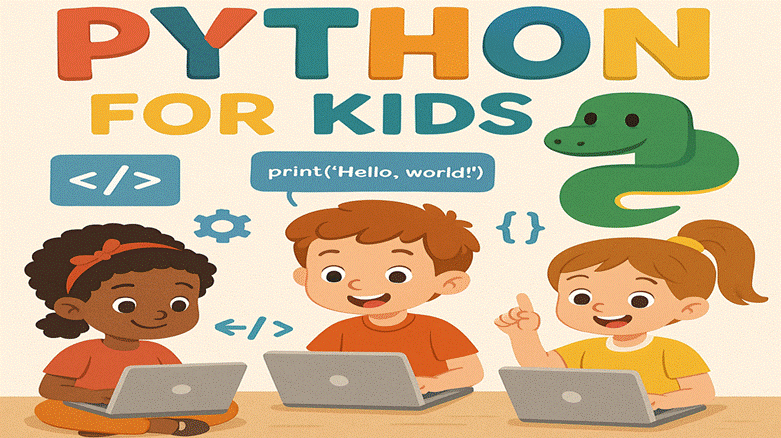The ability to write code is now as important as reading and arithmetic. Introducing kids to coding can open endless possibilities for them. Your child can learn many programming languages, and Python stands out as a great one for kids.
Whether your kid is exploring artificial intelligence (AI) or gearing up to create interactive websites and fun projects, Python is a good language to learn for their first exposure to coding. These top reasons explain why.
1. A Beginner-Friendly Programming Language
Unlike other programming languages, Python has a simple and readable syntax, making learning to code easy for young learners who are just beginning to understand computer programming.
You can enrol your child in Python for Kids courses to get them started. Here’s why:
- Python’s structure is similar to English’s, with minimal punctuation and a logical flow of the code so that new coders can understand it easily.
- Kids can focus on basic coding concepts without dealing with the complex rules of Python programming.
- It’s easy to install Python on most devices.
- Kids can work on interactive exercises and write code in just minutes.
2. Builds Critical Thinking and Problem-Solving Skills
Python coding teaches children to think logically and plan their work before they code. Their critical thinking skills are tested when they debug and test code.
As they solve problems, they’ll learn to work with others, tackle challenges, and be resilient. Kids will also learn to identify patterns and understand sequences with their code, sharpening their logical thinking that goes beyond coding.
3. Nurtures Creative and Independent Learning
Your kids’ creative thinking skills are trained when they learn Python coding. Children can make their own projects that will help them explore their interests. Here are the exciting projects they can make with Python:
- Interactive stories
- Games
- Visual art
- Chatbots
- Quizzes
- Drawing apps
Kids can use user input to customise program responses. With Python, kids can express their creativity by making real-world applications for schoolwork, hobbies, and automation, and own their work. They’ll also get a sense of what Python developers really do.
4. Teaches Maths and Logic
Python allows kids to visualise abstract mathematical concepts so they’ll easily understand variables, functions, and loops. Python projects also support math proficiency by letting kids practice with logic and formulas. With coding, children can learn classroom maths in a fun and engaging manner and develop their computational fluency.
5. Opens Doors to AI and Data Science
Python is commonly used in AI, machine learning, and data science. When kids learn Python early, they have a huge advantage in the job market when they grow up and look for jobs.
Python allows your child to create Python programs that generate insights and analyse data. They’ll understand how machines “make decisions” and explore models that predict or perform statistical analyses in many fields.
6. Makes Programming Logic Easy to Understand
Python is one of those simple programming languages that clearly presents key concepts to children. When your kids understand variables and loops, they can begin working on small coding projects to see how the elements combine. Soon enough, they can apply their coding skills to more complex programs without struggling too much.
7. Boundless Possibilities for Advanced and Community Learning
Once your child knows the basics and is at ease with the learning process, Python opens more doors to advanced topics. They can develop their AI, web development, computer science, and data analysis skills.
If they want to dabble in web content, Python is great for teaching kids to automatically post content using Python scripts and analyse data from the blog post.
The possibilities of what your child can learn from Python are endless than you think. Aside from the advanced topics, kids can also belong to a community of young programmers who share instant feedback on coding projects. They can find inspiration from others when working on their projects.
8. Widely Used in Schools, Universities, and Careers
Teachers, professionals, and researchers worldwide use Python, teaching your child valuable and relevant lessons about adapting to the digital world. Universities use Python to teach computer science and STEM courses, while tech companies hire Python developers for various roles, such as:
- Software developers: Young coders can build their coding skills to build software for the public.
- Full-stack engineers: This job entails learning both front-end and back-end website development. The front end deals with user interface design and user experience, while the back end deals with the servers.
- Machine learning engineers: These people build and train AI models and process large data sets.
- Data scientists: They solve complex business problems by collecting and analysing large amounts of data from different sources.
Final Thoughts
Python is an ideal language for kids who want to learn coding from the ground up. The simple syntax is easy to understand and powerful enough to create practical applications. From interactive stories to AI and data analysis, Python prepares children for a future where technology and creativity meet in one place.



